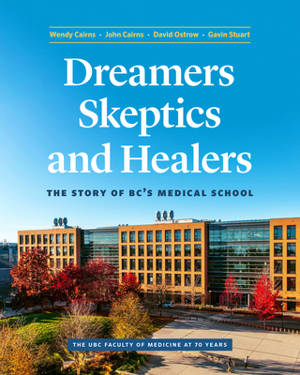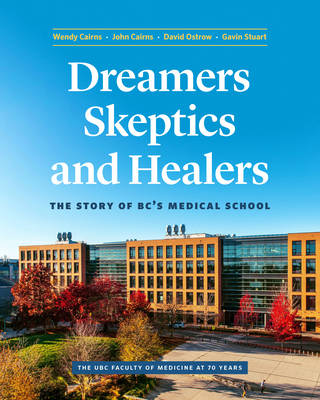
- Retrait gratuit dans votre magasin Club
- 7.000.000 titres dans notre catalogue
- Payer en toute sécurité
- Toujours un magasin près de chez vous
- Retrait gratuit dans votre magasin Club
- 7.000.000 titres dans notre catalogue
- Payer en toute sécurité
- Toujours un magasin près de chez vous
Dreamers, Skeptics, and Healers
The Story of Bc's Medical School
Wendy Cairns, John Cairns, David Ostrow, Gavin Stuart
Livre relié | Anglais
27,95 €
+ 55 points
Description
The UBC Faculty of Medicine at 70 Years
A legacy of care. Hailed as one of the world's top-ranked medical schools, the UBC Faculty of Medicine is globally recognized as a leader in medical education and health sciences research. In celebration of its 70th anniversary, this richly illustrated history is an inspiring reflection on the Faculty's rise from humble beginnings to its standing today as a beacon of excellence. Unlikely though it may seem in 2021, the Faculty's creation was threatened from the moment British Columbia entered Confederation in 1871. Proposals for a provincial medical school encountered myriad challenges. There was no university until 1915. Financial barriers, the apathy of provincial politicians and conflict among physicians as to the need for and the optimal location of a medical school and a potential university hospital led to recurrent setbacks and delay. It took eight decades for the dream to become a reality. And yet, establishing the medical school was only the first of many milestones to achieve over great odds. When the first cohort of students arrived in 1950, they discovered their school--really, just a few huts--was located far from the centre of Vancouver, on land cleared in the forests of Point Grey, and with little in the way of permanent university buildings. With limited budgets and resources, dean after dean struggled to ensure high quality medical education and to establish medical research. And the outcome? The Faculty of Medicine not only survived, it thrived. Today, the Faculty's medical undergraduate program is the fourth largest in North America. Its faculty members have garnered numerous illustrious awards--including the Nobel Prize. Its province-wide, distributed undergraduate and postgraduate program, established in 2004 as the first of its kind in Canada, is developing a new generation of doctors, bringing health education to remote regions and communities, and enhancing the quality of health care. And its researchers continue to make breakthroughs in the priority areas of precision health, cancer, brain and mental health, heart and lung health, population health and chronic diseases as well as across the breadth of health and life sciences.Spécifications
Parties prenantes
- Auteur(s) :
- Editeur:
Contenu
- Nombre de pages :
- 192
- Langue:
- Anglais
Caractéristiques
- EAN:
- 9781989603895
- Date de parution :
- 27-04-21
- Format:
- Livre relié
- Format numérique:
- Genaaid
- Dimensions :
- 213 mm x 254 mm
- Poids :
- 1133 g







